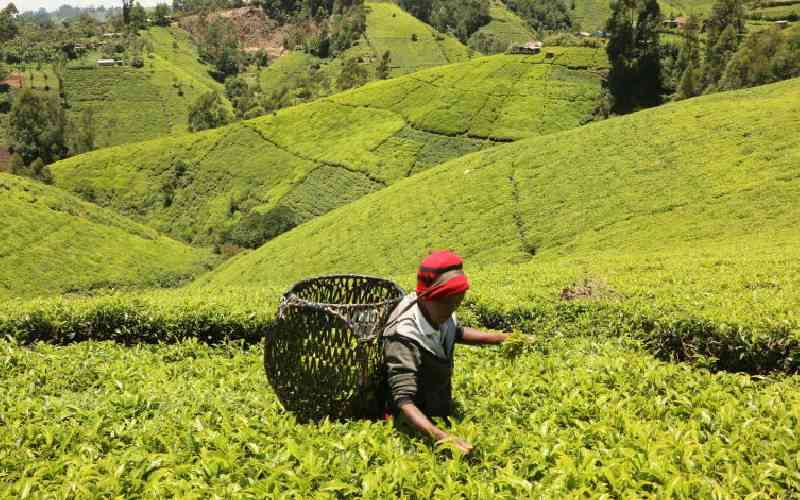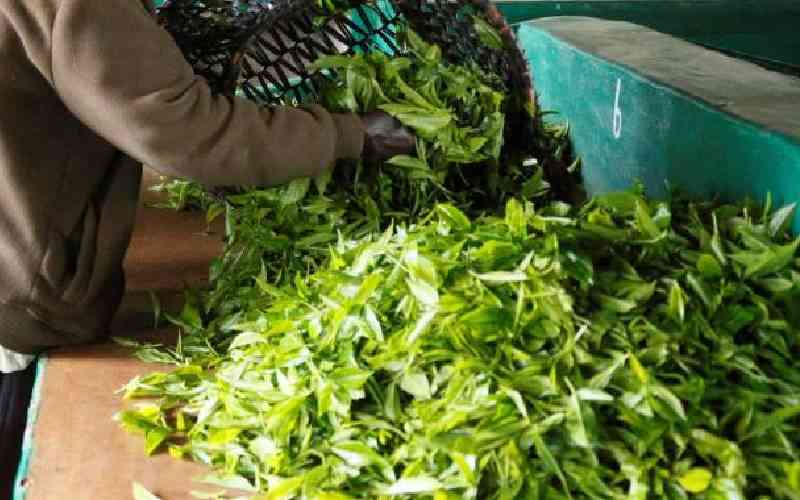
Tea farms in Central Kenya are slowly recovering from a prolonged dry spell that hit the region since last year.
The farmers will receive a mini bonus of Sh5 for every kilogramme of green tea leaf supplied so far, up from Sh3 paid last year.
Announcing the new rates yesterday, KTDA Board Chairman Peter Kanyago also had some bad news for tea farmers in Central Kenya - that the end of year bonus payments might not be as high as they expect.
“Our farmers are aware their crop has been adversely affected by the prevailing drought, hence the lower bonus earnings even though rates still remain at Sh5 per kilogram of green tea delivered,’’ he said.
The improved pay, Mr Kanyago said, was as a result of good international tea prices coupled with increased production and the stability of the Kenyan shilling last year.
The improved payment was recorded in factories in zones one and four comprising Chinga Iria-ini, Gathuthi, Ragati and Gitugi.
In Kirinyaga, Ndima, Kangaita, Kimunye, Mununga and Thumaita will benefit.
In Murang’a, factories set to benefit from an improved mini bonus are Makomboki, Ngeere, Kanyenyaini, Gacharage, Githambo, Nduti, Kiru and Gatunguru.
He said the payment would be released to farmers any time between April and beginning of May to enable them to pay school fees.
While Sh5 might seem little, it translates to millions of shillings for tea farmers.
In Kirinyaga for instance, farmers will receive a total mini bonus of Sh200 million.
Zone Five KTDA Director Nyaga Karua said the farmers would receive Sh300 million in mini bonus from 60 million kilograms of green tea.
Last year, farmers received a historical pay of Sh80 billion in bonus, the biggest to have been paid in over two decades.
KTDA said the ongoing dry weather had reduced tea production by over 30 per cent.
Stay informed. Subscribe to our newsletter
The decline translated to less earnings for farmers across the 66 factories under the agency.
For instance, in Kirinyaga production declined from 60 million kilograms of green leaf last year to 40 million this year.
This has been attributed to the prevailing dry spell and scarce rains last year, which reduced the cumulative weight of tea.
“Even if prices were to remain favourable, cumulative weight has a positive effect on overall earning,” said Kanyago.
 The Standard Group Plc is a
multi-media organization with investments in media platforms spanning newspaper
print operations, television, radio broadcasting, digital and online services. The
Standard Group is recognized as a leading multi-media house in Kenya with a key
influence in matters of national and international interest.
The Standard Group Plc is a
multi-media organization with investments in media platforms spanning newspaper
print operations, television, radio broadcasting, digital and online services. The
Standard Group is recognized as a leading multi-media house in Kenya with a key
influence in matters of national and international interest.
 The Standard Group Plc is a
multi-media organization with investments in media platforms spanning newspaper
print operations, television, radio broadcasting, digital and online services. The
Standard Group is recognized as a leading multi-media house in Kenya with a key
influence in matters of national and international interest.
The Standard Group Plc is a
multi-media organization with investments in media platforms spanning newspaper
print operations, television, radio broadcasting, digital and online services. The
Standard Group is recognized as a leading multi-media house in Kenya with a key
influence in matters of national and international interest.










